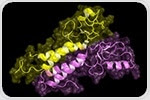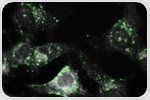| |  Researchers at CentraState Medical Center have shown that cryoablation, also known as cryotherapy, could be an effective treatment for low-risk breast cancer. The early indications of the technique’s effectiveness will be presented today at the annual meeting of the Radiological Society of North America. Researchers at CentraState Medical Center have shown that cryoablation, also known as cryotherapy, could be an effective treatment for low-risk breast cancer. The early indications of the technique’s effectiveness will be presented today at the annual meeting of the Radiological Society of North America. | |
|
| |  Women who underwent a supervised program of cardiovascular exercise during adjuvant breast cancer treatment experienced better cardiovascular function than those who were not part of the exercise program, according to results of the EBBA-II trial presented at the 2018 San Antonio Breast Cancer Symposium, held Dec. 4-8. Women who underwent a supervised program of cardiovascular exercise during adjuvant breast cancer treatment experienced better cardiovascular function than those who were not part of the exercise program, according to results of the EBBA-II trial presented at the 2018 San Antonio Breast Cancer Symposium, held Dec. 4-8. | |
|
| |  Radiation oncologists at the University of Maryland Marlene and Stewart Greenebaum Comprehensive Cancer Center are now treating patients with the GammaPod™, a new FDA-cleared radiation therapy for early-stage breast cancer. Radiation oncologists at the University of Maryland Marlene and Stewart Greenebaum Comprehensive Cancer Center are now treating patients with the GammaPod™, a new FDA-cleared radiation therapy for early-stage breast cancer. | |
|
| |  New results from a long-running trial to identify which new drugs or combinations of drugs are most effective in which types of breast cancer, show that two genomic tests are bringing the era of truly personalized medicine ever nearer. New results from a long-running trial to identify which new drugs or combinations of drugs are most effective in which types of breast cancer, show that two genomic tests are bringing the era of truly personalized medicine ever nearer. | |
|
| |  Using technology similar to the type that powers facial and speech recognition on a smartphone, researchers at the University of North Carolina Lineberger Comprehensive Cancer Center have trained a computer to analyze breast cancer images and then classify the tumors with high accuracy. Using technology similar to the type that powers facial and speech recognition on a smartphone, researchers at the University of North Carolina Lineberger Comprehensive Cancer Center have trained a computer to analyze breast cancer images and then classify the tumors with high accuracy. | |
|
| |  Research published today shows that circulating tumor cell count may provide an effective indicator of appropriate treatment choice for metastatic breast cancer. The risk of death was 35% lower among patients whose treatment was escalated according to the level of circulating tumor cells. Research published today shows that circulating tumor cell count may provide an effective indicator of appropriate treatment choice for metastatic breast cancer. The risk of death was 35% lower among patients whose treatment was escalated according to the level of circulating tumor cells. | |
|
| |  Only around a fifth of women at higher risk of developing breast cancer think they need to take a drug proven to help prevent the disease, according to new research funded by Cancer Research UK and published today (Monday) in Clinical Breast Cancer. Only around a fifth of women at higher risk of developing breast cancer think they need to take a drug proven to help prevent the disease, according to new research funded by Cancer Research UK and published today (Monday) in Clinical Breast Cancer. | |
|
| |  A new study has revealed that breast cancer cells recruit bone marrow-derived fibroblasts to enhance their growth. It is hoped that the discovery will lead to the development of new treatments that target the cells in and around the tumor. A new study has revealed that breast cancer cells recruit bone marrow-derived fibroblasts to enhance their growth. It is hoped that the discovery will lead to the development of new treatments that target the cells in and around the tumor. | |
|
| |  Uncovering a novel mechanism that promotes growth of breast cancer bone metastasis has revealed a potential Achilles' heel for these cancer cells. Reported in the journal Cancer Cell, the study shows that interfering with this mechanism can reduce the risk of relapses in animal models. Uncovering a novel mechanism that promotes growth of breast cancer bone metastasis has revealed a potential Achilles' heel for these cancer cells. Reported in the journal Cancer Cell, the study shows that interfering with this mechanism can reduce the risk of relapses in animal models. | |













































No hay comentarios:
Publicar un comentario